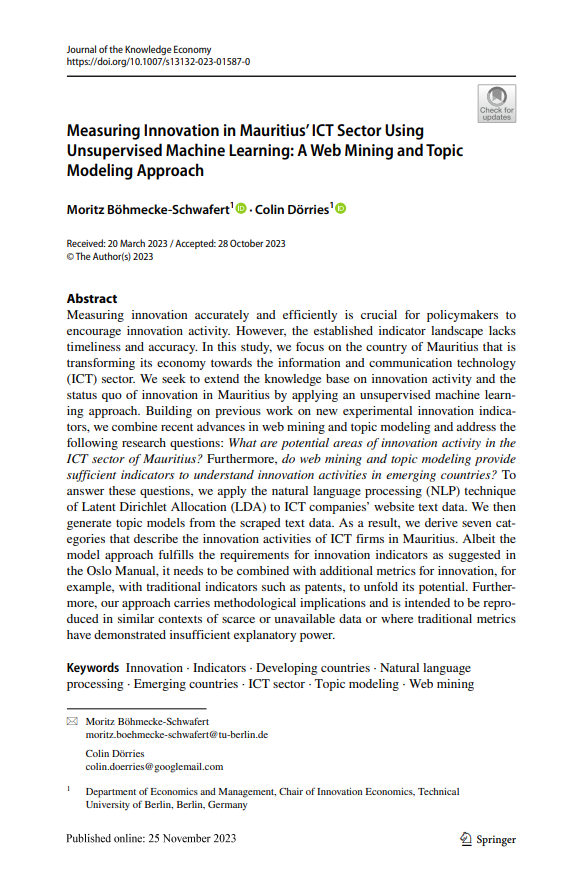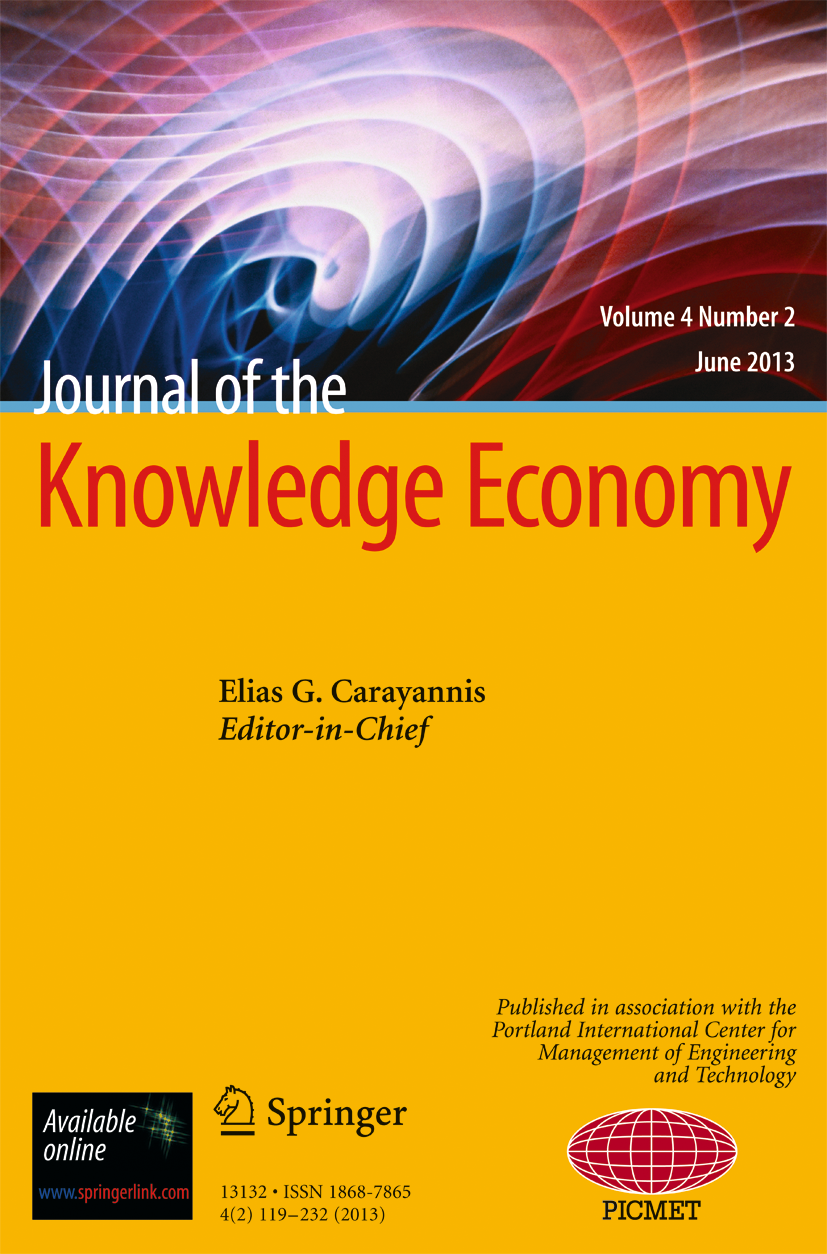Summary
I am thrilled to announce the publication of our latest research in the Journal of the Knowledge Economy. In this study, co-authored by Colin Dörries, we delve into the intricacies of measuring innovation in Mauritius’ Information and Communication Technology (ICT) sector using novel techniques in innovation research, namely web mining and topic modeling. By combining unsupervised machine learning with web mining, we offer a blueprint for future sector-specific innovation studies, in particular for innovation studies on emerging countries that usually lack data and where traditional innovation indicators are having limitation regarding lack of data and timeliness, cost-efficiency, or accuracy.

Background
In the dynamic landscape of emerging economies, the evaluation of innovation poses intricate challenges, particularly in the context of traditional indicators that have primarily catered to developed nations. The Oslo Manual 2018 defines innovation indicators as comprehensive statistical measures encapsulating inventive activities, necessitating a nuanced understanding of developmental, financial, and commercial dimensions. The complexity of assessing innovation is underscored by a systematic literature review revealing 82 distinct indicators, as delineated by Dziallas and Blind (2019). The Oslo Manual outlines crucial properties for innovation indicators, emphasizing their relevance, accuracy, reliability, precision, and timeliness. These properties form the foundation for methodological approaches, demanding a careful alignment with the distinctive characteristics of emerging economies.
ICT Evolution in Mauritius
Mauritius, as an illustrative case within the cohort of emerging economies, has undergone a transformative trajectory towards becoming an ICT-driven economy. The establishment of the Ministry of Information and Communication Technology in 1997 marked a seminal juncture, setting the stage for a strategic shift. The subsequent “Cyber Island” initiative in the early 2000s, coupled with the liberalization of the telecommunication sector in 2003, exemplifies the deliberate efforts to orchestrate a paradigmatic transition. Institutional robustness, manifested in high rankings for institutional quality and a resilient financial system, endowed Mauritius with an allure for multinational corporations seeking conducive environments. The ensuing ascent of Mauritius as a hub for business process optimization (BPO) firms is emblematic of the symbiotic relationship between institutional soundness and economic dynamism.
Innovation Landscape in Mauritius’ ICT Sector
Despite the pronounced contributions of the ICT sector to Mauritius’ GDP and employment landscape, the assessment of innovation within this domain encounters substantial complexities. Traditional output indicators, notably patents, exhibit a marked dearth of activity, with a discernible proportion emanating from non-resident entities. Metrics such as R&D expenditures as a percentage of GDP and the volume of scientific publications present modest figures, indicative of a nuanced innovation landscape. Challenges in Intellectual Property Rights (IPR) regulation, compounded by the non-ratification of the Patent Cooperation Treaty (PCT), further contribute to the intricacies of gauging innovation in Mauritius. This multifaceted scenario underscores the imperative for a more nuanced and context-specific paradigm in assessing innovation within the confines of emerging economies. Innovation, a cornerstone of economic growth, often eludes conventional measurement in emerging economies like Mauritius. Traditional indicators, relying on input-output measures, patents, and surveys, fall short in capturing the dynamic landscape of the ICT sector.
Methodology
This study introduces a lean methodology for exploring innovation activities, employing unsupervised machine learning and natural language processing (NLP) in a four-step process that should serve as a blueprint for future innovation studies.
- Text Data Analytics with Machine Learning:
- Data Collection: Constructing a list of URLs for Mauritian ICT firms through company directories.
- Web Scraping: Utilizing the ARGUS tool to scrape unstructured text data from 325 company websites.
- De-contextualization:
- Natural Language Processing (NLP): Applying NLP techniques, specifically Latent Dirichlet Allocation (LDA), for information extraction.
- Topic Modeling: Focusing on LDA as a generative probabilistic model, using coherence scores to determine the optimal number of topics (seven topics identified).
- Re-contextualization:
- Intertopic Distance Map (ITDM): Employing PyLDAvis for visual analysis of results, understanding relationships and thematic distances between topics.
- Qualitative Coding: Involving an iterative process with co-authors, reviewing top keywords and determining final titles for each identified topic.
Our Findings
Our study revealed seven categories of innovation activity within Mauritius’ ICT sector:
- BPO and Management Services: Focused on process innovation, leveraging competitive advantages and government initiatives.
- Cloud: Interconnected with BPO services, supporting SMEs and aligning with the government’s Digital Mauritius 2030 plan.
- Security: Emphasizing cybersecurity innovations, reflected in Mauritius’ high ranking in the Global Cybersecurity Index.
- Consulting: Supporting digital transformation in various sectors, particularly prominent in the financial industry.
- Web Development: A pillar of the ICT sector, serving as vital service providers for key economic pillars.
- Mobile Connectivity: Engaged in mobile ecosystems, capitalizing on high mobile phone penetration and government initiatives.
- Generic Category: Heterogeneous, reflecting diverse tokens that defy specific categorization.
These findings triangulated with literature and further quantitative data on the innovation ecosystem of Mauritius contribute to a nuanced understanding of innovation in the ICT sector. The study emphasizes the importance of timely and accurate innovation indicators for effective policymaking and introduces a methodological blueprint for future research in emerging economies
Implications and Contributions
Our study’s results and implications present a step forward in understanding and measuring innovation activities, particularly in emerging economies. The major contributions and implications can be summarized as follows:
-
Methodological Streamlining: The study introduces a lean methodology, leveraging natural language processing and machine learning, streamlining the exploration of innovation activities.
-
Adaptability: The modular design of the approach ensures easy adaptation to diverse emerging economies, offering a versatile tool for future research.
-
Insightful Validation: Identification and analysis of seven innovation topics provide rich insights into the dynamics of innovation in an emerging economy, setting the stage for more targeted studies.
-
Policy Alignment: Policymakers can align strategies with identified innovation areas, fostering a conducive environment for technological advancements.
-
Continuous Monitoring: Given the dynamic nature of innovation, a continuous monitoring approach is recommended for adaptive policies.
If you want to learn more about this research, you can find the article open access in The Journal of Knowledge Economy here.
